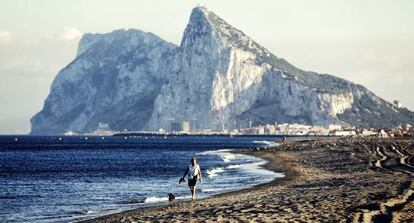Gibraltar and Spain accuse each other of encouraging crime on the Rock
Chief Minister Picardo blames Spanish authorities for allowing drug trafficker to escape

After an opening gambit by the United Kingdom on Sunday, when it condemned Spain for allowing its law enforcement vessels to illegally enter Gibraltarian waters, both countries on Monday accused each other of encouraging criminal activity in the area.
Gibraltar’s Chief Minister Fabian Picardo has accused the Spanish authorities of helping an alleged drug trafficker escape by not asking Gibraltarian officials for their help during Sunday’s boat-and-helicopter chase of a smuggling vessel in disputed territorial waters.
The 18-kilometer sea and air pursuit of a Spanish boat on Sunday ended with the arrests of two suspects by the Royal Gibraltar Police, but a third person was able to escape.
Ships are on routine patrols under the law to ensure illegal activities do not take place” Spanish Foreign Ministry official
The actions by the Spanish Customs Surveillance Service (SVA) “have ultimately resulted in the escape of a criminal that citizens on both sides of the frontier would have liked to have seen arrested and imprisoned for his drug trafficking,” Picardo said in a statement posted on the Gibraltar’s government website.
“If the SVA had been doing a good job of chasing these criminals for 18km in the Strait, they should have culminated in alerting the excellent Gibraltar law enforcement agencies of the Royal Gibraltar Police […] to take over the chase,” he said.
Meanwhile, the mayor of the nearby Spanish city of Algeciras (Cádiz), José Ignacio Landaluce, who is also a national deputy for the ruling Popular Party, said what really ought to be criticized was why traffickers sought “shelter” in Gibraltar when they were being pursued. “What there should be is more collaboration on the part of the Gibraltar government,” he said on Monday.
Diplomatic tensions have risen between Spain and Britain over the incident after the British Foreign Office accused Spanish authorities of violating international laws for allowing SVA vessels to “repeatedly” enter Gibraltar territorial waters without notifying Gibraltarian authorities.
For its part, Spain had rejected the notion that it committed any violations because the Spanish government does not recognize the waters as belonging to Gibraltar.
“There is no incident. Spain recognizes the waters as Spanish territory,” said a Spanish Foreign Ministry official on Monday. “Ships are performing their routine patrols under the law to ensure illegal activities do not take place.”
But Picardo took the dispute another step by blaming the SVA for letting the alleged trafficker escape.
“The SVA’s failure to cooperate has therefore ironically thwarted the proper law enforcement objective of their activity,” the chief minister said. “It beggars belief that the SVA have acted in this way that, in effect, has allowed a criminal who should be behind bars to get away.”
At 2.40am Sunday, the Royal Gibraltar Police Marine Section received reports of fast boat and helicopter activity in the area of Sandy Bay, according to the Gibraltar government.
A SVA rapid action vessel launched a small dinghy to recover the suspects’ boat near a sea barrier at Sandy Bay.
“The SVA informed the RGP that they had been chasing suspected drug smugglers who had jettisoned several bales of drugs,” the statement said. “The RGP reminded the SVA that Gibraltar’s law enforcement agencies have exclusive jurisdiction over British Gibraltar Territorial Waters and they retained custody of the suspect vessel.”
Gibraltarian authorities and the Royal Navy escorted the SVA vessels out of the disputed waters, said the government.
Tu suscripción se está usando en otro dispositivo
¿Quieres añadir otro usuario a tu suscripción?
Si continúas leyendo en este dispositivo, no se podrá leer en el otro.
FlechaTu suscripción se está usando en otro dispositivo y solo puedes acceder a EL PAÍS desde un dispositivo a la vez.
Si quieres compartir tu cuenta, cambia tu suscripción a la modalidad Premium, así podrás añadir otro usuario. Cada uno accederá con su propia cuenta de email, lo que os permitirá personalizar vuestra experiencia en EL PAÍS.
¿Tienes una suscripción de empresa? Accede aquí para contratar más cuentas.
En el caso de no saber quién está usando tu cuenta, te recomendamos cambiar tu contraseña aquí.
Si decides continuar compartiendo tu cuenta, este mensaje se mostrará en tu dispositivo y en el de la otra persona que está usando tu cuenta de forma indefinida, afectando a tu experiencia de lectura. Puedes consultar aquí los términos y condiciones de la suscripción digital.








































